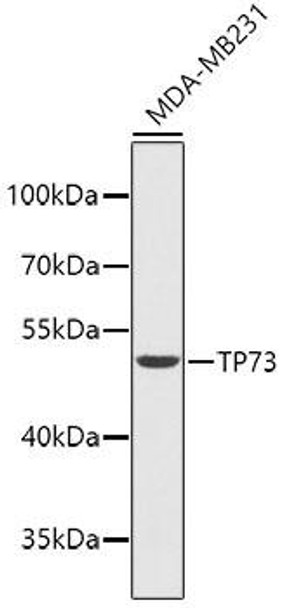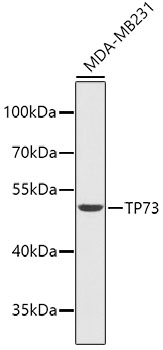Anti-TP73 Antibody (CAB2781)
- SKU:
- CAB2781
- Product type:
- Antibody
- Reactivity:
- Human
- Mouse
- Host Species:
- Rabbit
- Isotype:
- IgG
- Research Area:
- Cell Death
Frequently bought together:
Description
| Antibody Name: | Anti-TP73 Antibody |
| Antibody SKU: | CAB2781 |
| Antibody Size: | 20uL, 50uL, 100uL |
| Application: | WB |
| Reactivity: | Human, Mouse |
| Host Species: | Rabbit |
| Immunogen: | Recombinant protein of human TP73 |
| Application: | WB |
| Recommended Dilution: | WB 1:200 - 1:1000 |
| Reactivity: | Human, Mouse |
| Positive Samples: | MDA-MB231 |
| Immunogen: | Recombinant protein of human TP73 |
| Purification Method: | Affinity purification |
| Storage Buffer: | Store at -20°C. Avoid freeze / thaw cycles. Buffer: PBS with 0.02% sodium azide, 50% glycerol, pH7.3. |
| Isotype: | IgG |
| Sequence: | Email for sequence |
| Gene ID: | 7161 |
| Uniprot: | O15350 |
| Cellular Location: | Cytoplasm, Nucleus |
| Calculated MW: | 38- 69kDa |
| Observed MW: | 51kDa |
| Synonyms: | TP73, P73 |
| Background: | This gene encodes a member of the p53 family of transcription factors involved in cellular responses to stress and development. It maps to a region on chromosome 1p36 that is frequently deleted in neuroblastoma and other tumors, and thought to contain multiple tumor suppressor genes. The demonstration that this gene is monoallelically expressed (likely from the maternal allele), supports the notion that it is a candidate gene for neuroblastoma. Many transcript variants resulting from alternative splicing and/or use of alternate promoters have been found for this gene, but the biological validity and the full-length nature of some variants have not been determined. |
| UniProt Protein Function: | Participates in the apoptotic response to DNA damage. Isoforms containing the transactivation domain are pro-apoptotic, isoforms lacking the domain are anti-apoptotic and block the function of p53 and transactivating p73 isoforms. May be a tumor suppressor protein. |
| NCBI Summary: | This gene encodes a member of the p53 family of transcription factors involved in cellular responses to stress and development. It maps to a region on chromosome 1p36 that is frequently deleted in neuroblastoma and other tumors, and thought to contain multiple tumor suppressor genes. The demonstration that this gene is monoallelically expressed (likely from the maternal allele), supports the notion that it is a candidate gene for neuroblastoma. Many transcript variants resulting from alternative splicing and/or use of alternate promoters have been found for this gene, but the biological validity and the full-length nature of some variants have not been determined. [provided by RefSeq, Feb 2011] |
| UniProt Code: | O15350 |
| NCBI GenInfo Identifier: | 8928244 |
| NCBI Gene ID: | 7161 |
| NCBI Accession: | O15350.1 |
| UniProt Secondary Accession: | O15350,O15351, Q17RN8, Q5TBV5, Q5TBV6, Q8NHW9, Q8TDY5 Q8TDY6, B7Z7J4, B7Z8Z1, B7Z9C1, C9J521, |
| UniProt Related Accession: | O15350 |
| Molecular Weight: | 61,694 Da |
| NCBI Full Name: | Tumor protein p73 |
| NCBI Synonym Full Names: | tumor protein p73 |
| NCBI Official Symbol: | TP73 |
| NCBI Official Synonym Symbols: | P73 |
| NCBI Protein Information: | tumor protein p73 |
| UniProt Protein Name: | Tumor protein p73 |
| UniProt Synonym Protein Names: | p53-like transcription factor; p53-related protein |
| Protein Family: | Tumor protein |
| UniProt Gene Name: | TP73 |



